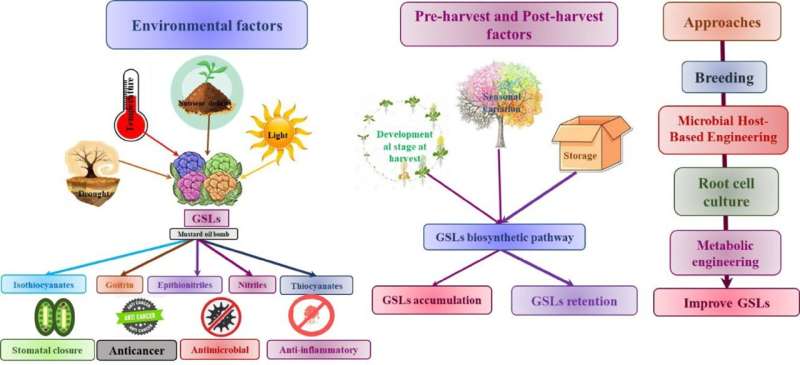This article has been reviewed according to Science X's editorial process and policies. Editors have highlighted the following attributes while ensuring the content's credibility:
fact-checked
trusted source
proofread
Unlocking glucosinolates' potential: Enhancing nutrition and stress tolerance in Brassica crops

A research team has reviewed the potential of glucosinolates, compounds found in Brassicaceae plants like cabbage and broccoli, to enhance stress tolerance and provide health benefits through their hydrolysis products.
Their review explores the use of bioactive glucosinolates to advance sustainable agriculture. Techniques such as traditional breeding, transgenic methods, and microbial engineering were examined to enhance glucosinolate content.
Future applications include manipulating glucosinolate-related genes to improve crop resilience and nutritional value, paving the way for healthier, stress-tolerant Brassica crops.
Brassica crops, valued for their diverse edible components, are widely cultivated for vegetables, oilseeds, and condiments. They possess three genomes (A, B, and C), which combine to form various species. Glucosinolates (GSLs), secondary metabolites produced by Brassicaceae, protect against herbivores and stress, and their beneficial isothiocyanates promote human health.
Despite advances in optimizing GSL accumulation, challenges remain in effectively enhancing GSL content.
A study published in Vegetable Research on 23 May 2024, enhances our understanding of GSLs and provides a theoretical basis for increasing GSL levels in Brassica crops.
This review explores the structure, health benefits and synthesis of GSLs in Brassicaceae plants. GSLs, secondary metabolites found in nearly all Brassica species, are classified into aromatic, indole, and aliphatic groups based on their precursor amino acids.
These compounds, produced through distinct metabolic pathways, have been extensively studied for their health benefits, including anticancer, anti-inflammatory, wound-healing, antioxidant, and antimicrobial properties.
The review highlights the accumulation of GSLs in different plant parts, with sprouts containing the highest concentrations. Researchers have described various genes for GSL production, particularly in Arabidopsis thaliana, which serve as a model for understanding GSL biosynthesis in Brassica crops.
Despite significant progress, challenges remain in enhancing GSL content and stability, influenced by genetic, environmental, and agronomic factors. Strategies like plant breeding, biotechnology, metabolic engineering, and microbial host-based engineering are employed to increase GSL levels.
Future research aims to improve GSL synthesis by targeting key regulatory genes and pathways, using advanced techniques such as CRISPR/Cas9 for precise genetic modifications.
According to the study's lead researcher, Yogesh K. Ahlawat, "The goal of this review is to help us learn more about the complicated relationships between glucosinolate-related processes and how they can be used to help plants deal with stress."
In summary, researchers reviewed GSLs in Brassicaceae plants, highlighting their role in stress tolerance and health benefits. They summarized the research progress of traditional breeding, transgenic techniques, and microbial engineering to enhance GSL content.
Future research will focus on optimizing GSL production through advanced biotechnological methods and genetic manipulation, such as CRISPR/Cas9, to develop healthier, stress-tolerant Brassica crops that meet growing consumer demand for nutritious foods.
More information: Shakshi Bansal et al, Unraveling the potential of glucosinolates for nutritional enhancement and stress tolerance in Brassica crops, Vegetable Research (2024). DOI: 10.48130/vegres-0024-0016
Provided by Chinese Academy of Sciences




















